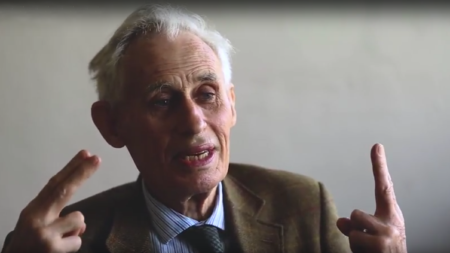Podcast: Play in new window | Download
Subscribe: Spotify | Email | RSS
 Professor Swinburne is famous for his many books which carefully develop and defend Christian claims. In this talk given to the Evangelical Philosophical Society in March of 2018, he gives his latest thoughts on the Trinity.
Professor Swinburne is famous for his many books which carefully develop and defend Christian claims. In this talk given to the Evangelical Philosophical Society in March of 2018, he gives his latest thoughts on the Trinity.
Swinburne’s is usually called a “social” Trinity theory, what I call a “three self” theory. For him, the “Persons” of the Trinity are so many selves, three conscious, intelligent, intentionally acting beings (individual entities, substances), capable of love and cooperation.
Is this a distinctively eastern or “Greek” theory, as opposed to western or “Latin” Trinity theories? Swinburne denies that it is, sketching his understanding of catholic views on the Trinity from the last 4th c. into the modern era. He also explains why, in his view, it is important for most trinitarians to have a philosophical argument for the Trinity. He defends the coherence of multiple divine beings, and then gives his latest version of his a priori argument that there must be exactly three divine persons, an argument of general sort discussed in our previous episode. Finally, he handles some interesting questions and objections in the Q&A portion of his presentation.
Do you find this to be a compelling account of the Trinity? Why or why not?
Links for this episode:
- Evangelical Philosophical Society
- The Saint Constantine School
- Southwestern Baptist Theological Seminary – Houston Campus
- Joshua Farris
- Cameron Bertuzzi’s interview and portraits of Richard Swinburne @ Capturing Christianity
- Richard Swinburne
- podcast 58 – We can’t prove the Trinity by reason alone
- podcast 57 – Richard Swinburne on the Trinity
- podcast 56 – Richard Swinburne on his life and work
- podcast 230 – The Failure of Fashionable Antiunitarian Arguments
- This week’s thinking music is “His Last Share of the Stars” by Doctor Turtle.

Awesome talk, your question about Gods ability to forgo an infinity of goods( by not creating the Cosmos), thereby suggesting his possibility of forgoing creation of Son and Spirit was a good one. But I really thought the second to last question was a good one- If fully divine agents can be created or instantiated as in the case of the Son and Spirit ( if being uncaused is not a necessary property of divinity) then the question – “who created God?”, seems much more plausible.
Comments are closed.